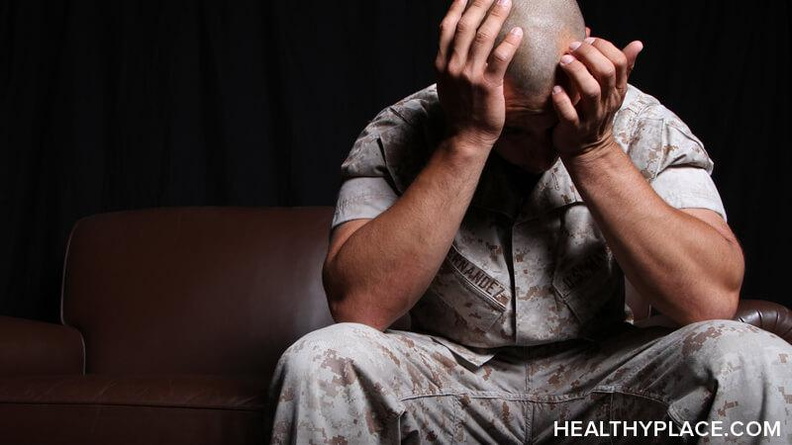Mental Illness and the Military: Stigmatizing the Invisible Enemy

Veterans Day always leaves me reflective about my short-lived Army career. I enlisted in 2003 as a specialist, but had a nervous breakdown during Basic Combat Training. I was hospitalized pending discharge--and saw firsthand the stigma that mental illness has in the military.
Reporting Mental Illness in the Military
I first became suicidal when I started hallucinating. I could feel myself ready to crash and burn. So, according to protocol, I told my drill sergeant. What happened next would make anyone suicidal if they weren't already.
He screamed insults about me in front of the whole company. He referred to me as crazy and threatened me with punishment. Then he pulled two soldiers out of the company and assigned them to guard me. We spent the night on the floor of his office, and the next day I was called in front of the first sergeant. He told me that I'd better not be faking it, then sent me in for a psychiatric evaluation.
The counselor who did the evaluation asked me if I was trying to "manipulate" the Army and get sent home. He then told me to talk to a psychiatrist. By this point in time I was paranoid, and the psychiatrist had to assure me he wasn't trying to get me for any rules violations. He rebuked me for following my recruiter's advice and not disclosing my psychiatric history during the physical, then hospitalized me.
It was a nightmare.
Crime of Malingering Addresses Mental Illness in the Military
 Self-injury is considered a crime in the military. It's covered under Article 134 of the Uniform Code of Military Justice (UCMJ), and is punishable by a maximum of dishonorable discharge, forfeiture of all pay and allowances and 2 years confinement. If done during time of war in a hostile area, the maximum punishment is dishonorable discharge, forfeiture of all pay and allowances and 5 years confinement.
Self-injury is considered a crime in the military. It's covered under Article 134 of the Uniform Code of Military Justice (UCMJ), and is punishable by a maximum of dishonorable discharge, forfeiture of all pay and allowances and 2 years confinement. If done during time of war in a hostile area, the maximum punishment is dishonorable discharge, forfeiture of all pay and allowances and 5 years confinement.
That's if they determine you didn't do it to avoid work, service or duty.
If they think you did it to shirk your duty, it's called "malingering". That's covered under Article 115 of the UCMJ. The maximum punishment for malingering is dishonorable discharge, forfeiture of all pay and allowances, and 5 years confinement. If done during a time of war or in a hostile fire pay zone, the maximum punishment is dishonorable discharge, forfeiture of all pay and allowances, and 10 years confinement.
Mental illness is a discipline issue in the military. It is not seen as an illness.
You Can Help Change Mental Illness in the Military Procedures
Iraq Veterans Against the War is one organization dedicated to fighting for service members' right to heal from posttraumatic stress disorder, military sexual trauma and traumatic brain injury. Their most recent campaign is improving conditions at the Jesse Brown VA in Chicago.
I don't know of any other organizations that do this kind of work, so feel free to leave information in the comments.
Veterans sacrificed a lot for the country. The least we can do is give them a right to heal from that sacrifice.
APA Reference
Oberg, B.
(2012, November 15). Mental Illness and the Military: Stigmatizing the Invisible Enemy, HealthyPlace. Retrieved
on 2026, March 4 from https://www.healthyplace.com/blogs/borderline/2012/11/the-invisible-enemy-bpd-and-the-military
Author: Becky Oberg
Hi, when I read your experience on Basic training I feel so identified, because the same thing happened to me, on the fourth week of the training I was send to the hospital for 5 weeks because a supposed nervous breakdown, and resieved a discharge.